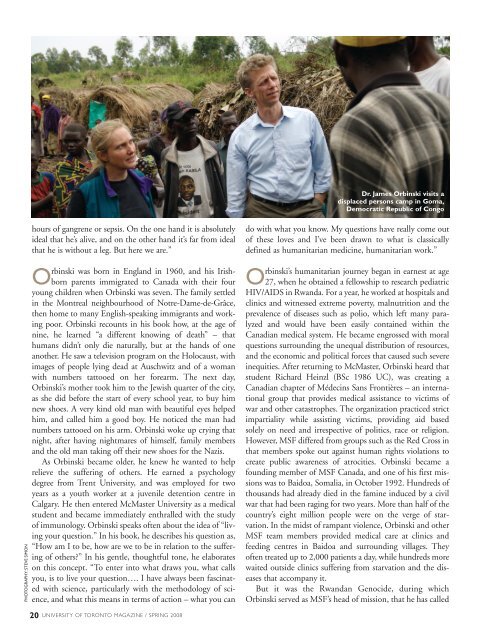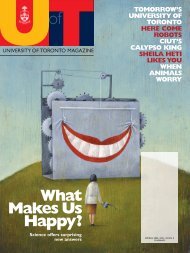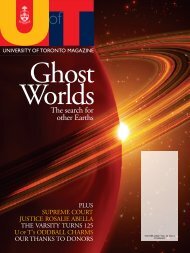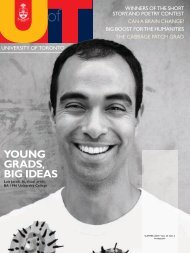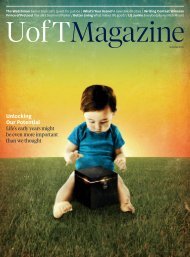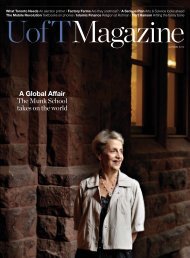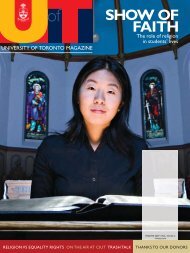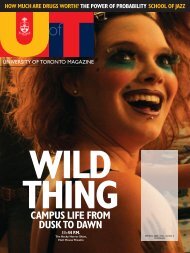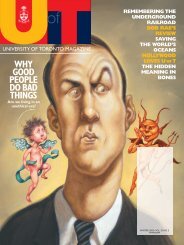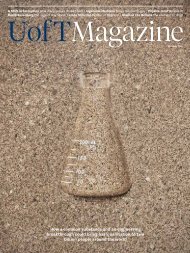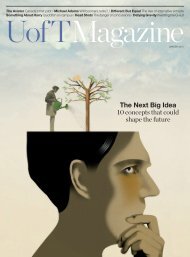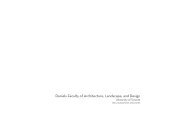20 MB - University of Toronto Magazine
20 MB - University of Toronto Magazine
20 MB - University of Toronto Magazine
- No tags were found...
Create successful ePaper yourself
Turn your PDF publications into a flip-book with our unique Google optimized e-Paper software.
Dr. James Orbinski visits adisplaced persons camp in Goma,Democratic Republic <strong>of</strong> CongoPHOTOGRAPHY: STEVE SIMONhours <strong>of</strong> gangrene or sepsis. On the one hand it is absolutelyideal that he’s alive, and on the other hand it’s far from idealthat he is without a leg. But here we are.”Orbinski was born in England in 1960, and his Irishbornparents immigrated to Canada with their fouryoung children when Orbinski was seven. The family settledin the Montreal neighbourhood <strong>of</strong> Notre-Dame-de-Grâce,then home to many English-speaking immigrants and workingpoor. Orbinski recounts in his book how, at the age <strong>of</strong>nine, he learned “a different knowing <strong>of</strong> death” – thathumans didn’t only die naturally, but at the hands <strong>of</strong> oneanother. He saw a television program on the Holocaust, withimages <strong>of</strong> people lying dead at Auschwitz and <strong>of</strong> a womanwith numbers tattooed on her forearm. The next day,Orbinski’s mother took him to the Jewish quarter <strong>of</strong> the city,as she did before the start <strong>of</strong> every school year, to buy himnew shoes. A very kind old man with beautiful eyes helpedhim, and called him a good boy. He noticed the man hadnumbers tattooed on his arm. Orbinski woke up crying thatnight, after having nightmares <strong>of</strong> himself, family membersand the old man taking <strong>of</strong>f their new shoes for the Nazis.As Orbinski became older, he knew he wanted to helprelieve the suffering <strong>of</strong> others. He earned a psychologydegree from Trent <strong>University</strong>, and was employed for twoyears as a youth worker at a juvenile detention centre inCalgary. He then entered McMaster <strong>University</strong> as a medicalstudent and became immediately enthralled with the study<strong>of</strong> immunology. Orbinski speaks <strong>of</strong>ten about the idea <strong>of</strong> “livingyour question.” In his book, he describes his question as,“How am I to be, how are we to be in relation to the suffering<strong>of</strong> others?” In his gentle, thoughtful tone, he elaborateson this concept. “To enter into what draws you, what callsyou, is to live your question…. I have always been fascinatedwith science, particularly with the methodology <strong>of</strong> science,and what this means in terms <strong>of</strong> action – what you cando with what you know. My questions have really come out<strong>of</strong> these loves and I’ve been drawn to what is classicallydefined as humanitarian medicine, humanitarian work.”Orbinski’s humanitarian journey began in earnest at age27, when he obtained a fellowship to research pediatricHIV/AIDS in Rwanda. For a year, he worked at hospitals andclinics and witnessed extreme poverty, malnutrition and theprevalence <strong>of</strong> diseases such as polio, which left many paralyzedand would have been easily contained within theCanadian medical system. He became engrossed with moralquestions surrounding the unequal distribution <strong>of</strong> resources,and the economic and political forces that caused such severeinequities. After returning to McMaster, Orbinski heard thatstudent Richard Heinzl (BSc 1986 UC), was creating aCanadian chapter <strong>of</strong> Médecins Sans Frontières – an internationalgroup that provides medical assistance to victims <strong>of</strong>war and other catastrophes. The organization practiced strictimpartiality while assisting victims, providing aid basedsolely on need and irrespective <strong>of</strong> politics, race or religion.However, MSF differed from groups such as the Red Cross inthat members spoke out against human rights violations tocreate public awareness <strong>of</strong> atrocities. Orbinski became afounding member <strong>of</strong> MSF Canada, and one <strong>of</strong> his first missionswas to Baidoa, Somalia, in October 1992. Hundreds <strong>of</strong>thousands had already died in the famine induced by a civilwar that had been raging for two years. More than half <strong>of</strong> thecountry’s eight million people were on the verge <strong>of</strong> starvation.In the midst <strong>of</strong> rampant violence, Orbinski and otherMSF team members provided medical care at clinics andfeeding centres in Baidoa and surrounding villages. They<strong>of</strong>ten treated up to 2,000 patients a day, while hundreds morewaited outside clinics suffering from starvation and the diseasesthat accompany it.But it was the Rwandan Genocide, during whichOrbinski served as MSF’s head <strong>of</strong> mission, that he has called<strong>20</strong> UNIVERSITY OF TORONTO MAGAZINE / SPRING <strong>20</strong>08


